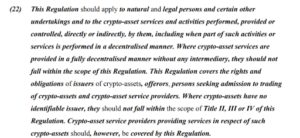The best fintechs to work for now, according to Credit Suisse

If you were thinking about moving from a large established bank to a smaller, scrappier fintech, you may have been dissuaded by events in recent months. As tech stocks have fallen and VC funding has dried up, fintechs from Robinhood to Klarna have cut jobs, along with crypto firms like Coinbase. Even if you get through the door, you might not stay there, and the chances of making money in stocks via an IPO look more remote than ever.
However, this does not mean that you should give up hope of a fintech job completely. In a massive new deck to inaugurate coverage of the EMEA payments and fintech sector, Credit Suisse lays out the bull (next to the bear) for the fintech ecosystem, the top listed names and the huge selection of private companies by market area.
Why fintech jobs aren’t dead
While the fintech sector has been hit by the perfect storm of war in Ukraine, rising inflation and a technology bear market, Credit Suisse says there are still valid reasons to believe the sector has growth ahead.
Much of the fintech industry is about payments and the global payments industry is huge. It is expected to grow at a CAGR of around 10% this year and next year. Online and offline payments are expected to blur, creating potential for large “omnichannel” players. Markets in Eastern Europe, Africa and Latin America are predicted to catch up as they move away from cash to cards. Highly manual B2B payment systems are being digitized; the overseas remittance market is being disrupted by fintechs such as Remitly and Zepz; ppeer to peer (P2P) payments (eg digital transactions between friends) are increasing. And the growth of the entire system is driven by increasing e-commerce for online shopping.
The best listed fintechs in EMEA
Credit Suisse’s analysts have a few publicly traded fintechs they recommend more than others to investors. Although they are not in the business of making employment recommendations, it is reasonable to assume that fintech with a healthy business model and rising stock prices will also be good places to work.
Some of their favorites in Europe are: Ayden, a Dutch payments company that allows businesses to accept e-commerce, mobile and payment gateways; Nexi, an Italian bank specializing in payment systems; Wise, an international transfer service and ‘neo-bank;’ Edenred, a B2B payment provider that started in France; and Network International, a company that provides technology-enabled payment solutions to merchants and financial institutions in the Middle East.
How to think fintech
The fintech industry is not only about payments, but it is a lot about payments. Credit Suisse’s analysts depict the landscape using the following chart. If you work in the fintech sector, you may be located on any of these routes.

Source: Credit Suisse. P2P = peer to peer. APM=alternative payment method. LPM=local payment method. AISP=Account Information Service Provider; PISP=Service provider for payment initiation; A2A=account to account payments.
Needless to say, most fintechs are not publicly traded companies. The fintech sector is full of private companies, some of which will succeed and some of which will not. Many will join together. Based on the chart above, Credit Suisse analysts identify the following top private fintechs in the payments space. The list is EMEA-focused, but includes some global players. Credit Suisse doesn’t comment on their viability, but the chart below shows the top players by area right now.
EMEA-focused payments and payment-related fintechs

Source: Credit Suisse
Needless to say, there are many other players in the fintech space. They include: payment processors such as PayPal, Square and Stripe, payment software platforms such as BlueSnap, Mindbody, Lightspeed Commerce and Shopify, and payment processors such as SumUp. There are B2B payment companies such as Divvy, AvidExchange, Expensify, Veem and Tipalti. There are buy-now-pay-later services such as: Affirm, Afterpay, Klarna and Splitit. There are APIs such as: Salt Edge, TrueLayer, Nordigen, Flinks, Yodlee, Yapily, Stripe and Plaid. There is also a wide variety of neobanks (defined by Credit Suisse as “a technology platform that offers financial services, built on the foundation of a current account and linked debit card”), as shown in the slide below.
Top fintechs: The neobanks

Source: Credit Suisse
However, the neobank sector is also developing its own ecosystem. Credit Suisse says banks in this category work with their own pool of partners. These include: Socure, Ally and Persona for KYC and compliance; Plaid, Fincity, Tink and Truelayer for API connectivity; Atomic, Pinwheel and Fintech for payroll account collection; and companies such as Moov, Treasury Prime and Synctera for the middle tier.
However, Credit Suisse’s analysts also note that neobanks are rarely profitable, pointing out that Forbes predicts that less than 5% of all neobanks will make money by 2022. So if you’re tempted by a neobank, you might be better off working for a fintech in a large established bank instead.
Major technology companies are entering fintech
The other option is to work for a large technology company that is moving into the fintech space. Credit Suisse’s analysts note that Alibaba (Alipay) and Tencent (WeChat) pioneered major technology companies’ move into fintech and are now moving into SE Asia to compete with Grab and Go-Jek. Among North American companies, Apple has Apple Pay, Apple Cash and Apple Card (with Goldman Sachs) and is believed to be developing its own payment processing infrastructure. Amazon is building a consumer payments ecosystem internally. However, Google scrapped its plans to launch Google Plex checking accounts in late 2021, suggesting that even fintech jobs under major tech umbrellas aren’t completely secure.
Click here to create a profile on eFinancialCareers. Make yourself visible to recruiters hiring for top technology and finance jobs.
Have a confidential story, tip or comment to share? Contact: [email protected] in the first instance. Whatsapp/Signal/Telegram also available (Telegram: @SarahButcher)
Please join us if you leave a comment at the bottom of this article: all our comments are moderated by humans. Sometimes these people may be sleeping, or away from their desk, so it may take a while for your comment to appear. Eventually it will—unless it’s offensive or libelous (in which case it won’t.)
Photo by Martin Sanchez on Unsplash
























